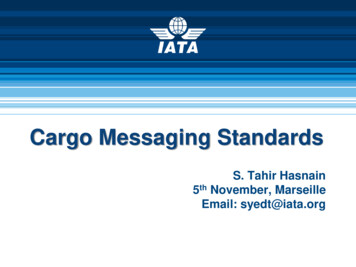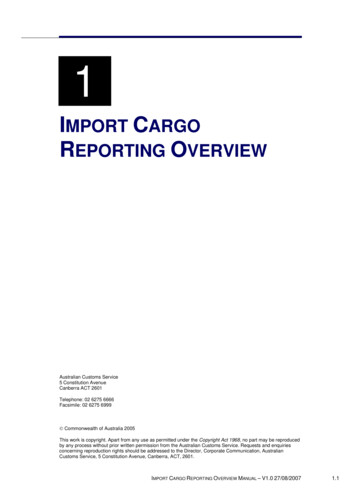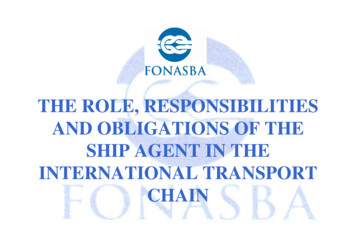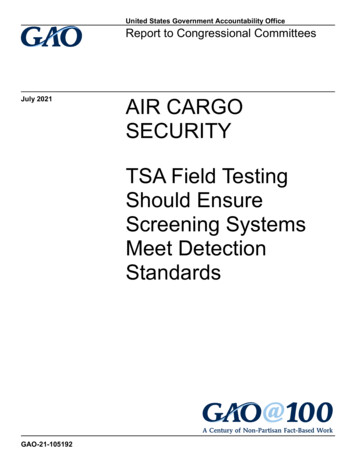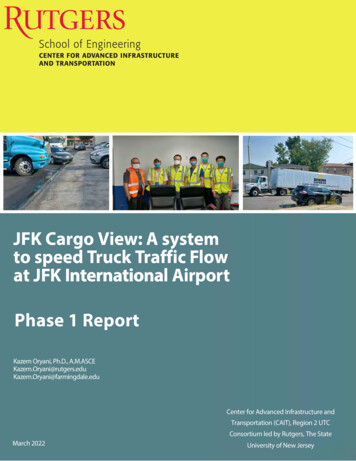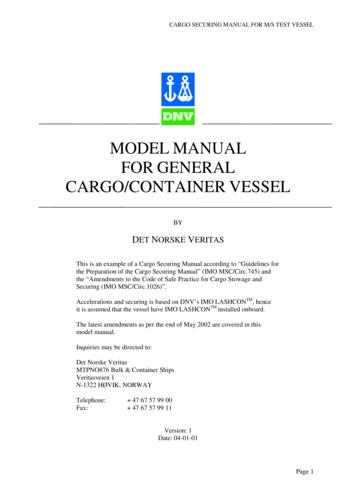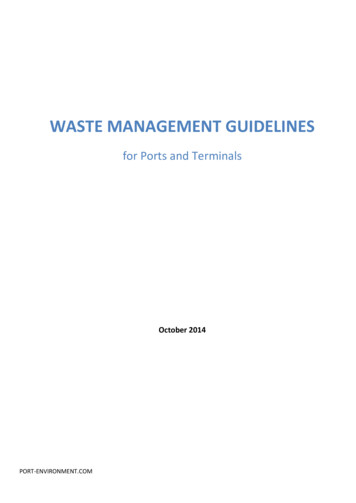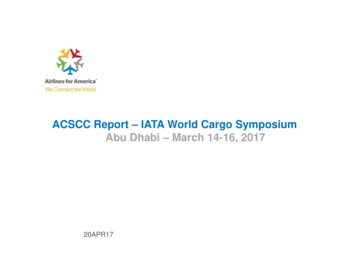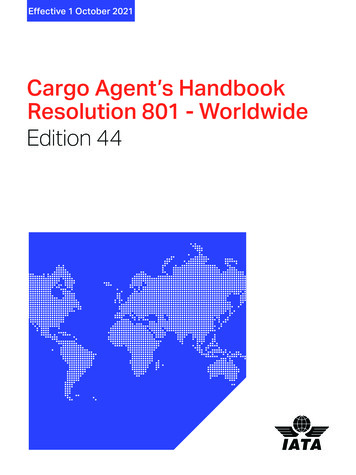
Transcription
Effective 1 October 2021Cargo Agent’s HandbookResolution 801 - WorldwideEdition 44
I ATA A R E A SA R C T I CO C E A NGREENLANDJan Mayen IsIcelandFaroe IsSt. Lawrence IsAleutian IsEUROPENORTHAMERICAASIAP A C I F I CO C E A NAzores IsP A C I F I CO C E A NBermuda IsCanary IsAT L A N T I CO C E A NHawaiian IsMENAMarcus IsNorthernMariana IsAFRICAWake IsMarshall IsMicronesiaGalapagos IsSOUTHAMERICAAscension IsCocos IsSt. Helena IsEaster IsMadagascarI N D I A NO C E A NAUSTRALIASouth GeorgiaAntarctica2Fanning IsFiji IsNew Caledonia IsNew ZealandPrince Edward Is1Kiribati3AREA 1 NORTH, CENTRAL, SOUTH AMERICA AND ENVIRONSAREA 2 EUROPE, MIDDLE EAST, AFRICAAREA 3 FAR EAST, AUSTRALIA, NEW ZEALAND, PACIFIC ISLANDSChristmas IsFrench PolynesiaHenderson IsPitcairn Is
Effective 1 October 2021Cargo Agent’s HandbookResolution 801 - WorldwideEdition 44International Air Transport AssociationMontreal - Geneva
NOTICEDISCLAIMER. The information contained in thispublication is subject to constant review in thelight of changing government requirements andregulations. No subscriber or other reader shouldact on the basis of any such information withoutreferring to applicable laws and regulations and/or without taking appropriate professional advice.Although every effort has been made to ensureaccuracy, the International Air Transport Association shall not be held responsible for any loss ordamage caused by errors, omissions, misprintsor misinterpretation of the contents hereof. Furthermore, the International Air Transport Association expressly disclaims any and all liability toany person or entity, whether a purchaser of thispublication or not, in respect of anything doneor omitted, and the consequences of anythingdone or omitted, by any such person or entityin reliance on the contents of this publication. International Air Transport Association. AllRights Reserved. No part of this publication maybe reproduced, recast, reformatted or transmitted in any form by any means, electronic ormechanical, including photocopying, recordingor any information storage and retrieval system, without the prior written permission from:Senior Vice PresidentFinancial Distribution and Data ServicesInternational Air Transport Association33, Route de l’Aéroport1215 Geneva 15 AirportSwitzerland 2021 International Air Transport Association. All rights reserved.Montreal - GenevaCataloguing in Publication data can be obtained from Library and Archives Canada.
TABLE OF CONTENTSPageForeword . viiMechanics of the IATA Cargo Agency Programme .xivSeeking Registration as an IATA Cargo Agent/Intermediary .xvFinancial Criteria—Bahrain . xviFinancial Criteria—Bangladesh. xviiiProposed Financial Criteria for Cargo Industry Credit Scheme (CICS) .xixFinancial Criteria—China. xxiFinancial Criteria—Chinese Taipei . xxiiFinancial Criteria—Eastern Africa . xxiiiLocal Financial Criteria—Egypt . xxivFinancial Criteria—Hong Kong. xxviiiFinancial Criteria—India . xxxFinancial Criteria—Indonesia . xxxiiFinancial Criteria—Israel. xxxiiiFinancial Criteria—Lebanon. xxxvFinancial Criteria—Japan . xxxvFinancial Criteria—Kuwait . xxxviFinancial Criteria—Korea . xxxviiFinancial Criteria—Malaysia . xxxixFinancial Criteria—Morocco . xlFinancial Criteria—Oman . xlFinancial Criteria—Pakistan . xliiFinancial Criteria—Qatar. xliiiFinancial Criteria—Russian Federation . xlvFinancial Criteria—Kingdom of Saudi Arabia. xlviiFinancial Criteria—Singapore. xlviiiFinancial Criteria—South Africa. lFinancial Criteria—Sri Lanka . liiFinancial Criteria—Thailand . liiiFinancial Criteria—The Philippines. livFinancial Criteria—Turkey. lvFinancial Criteria—United Arab Emirates. lviFinancial Criteria—Vietnam. lviiIATA Numeric Code . lixChanges within an Agency Requiring IATA Approval .lixIATA International Cargo Agents Training Programme .lxAir Cargo Security and Asset Protection. lxiiAir Cargo Automation . lxivIATA Dangerous Goods Regulations. lxviiiDangerous Goods in Electronic Format (eDGR).lxixIATA Live Animals Regulations . lxxPerishable Cargo Regulations Manual (PCR). lxxi
Cargo Agent's Handbook—Resolution 801—WorldwidePageUnit Load Device (ULD). lxxiiThe Cargo Accounts Settlement Systems—CASSlink .lxxiiAir Cargo Claims Procedures. lxxivUse of IATA Logo . 1r811d811e811f817821823Application of Changes in Rates. 1Low Density Cargo. 1Charges for Disbursements . 2Charge for Preparation of Air Waybill . 3The Consignment. 4Air Waybill . 5Bar Coded Label . 32Non-Bar Coded Label . 40Standards for Labels and Tags for Special Shipments .43Shipper's Request for Changes to Air Waybill and Shipment Record Amounts.44Procedures for Disbursements . 45IATA Dangerous Goods Regulations. 46IATA Live Animals Regulations. 46Cargo Electronic Data Interchange Message Standards.47Changes to Cargo Interchange Message Procedures (Cargo-IMP).47Use of Bar Codes and Bar Code Equipment in Cargo Applications.52Cargo Agency Rules . 52Section 1—Qualifications for Registration and Retention .52Section 2—Procedures . 56Section 3—Commission/Remuneration . 58Section 4—Measures Affecting an Agent's Standing .59Section 5—Change of Ownership, Legal Status, Name or Address .60Section 6—Review by Agency Commissioner.63Section 7—Collection of Funds; Irregularities and Default (other than under Cargo AccountsSettlement System—CASS-Export). 64Section 8—Air Waybill Transmittals, Billings, Remittances and Collections Defaults(under Cargo Accounts Settlement System—CASS-Export).64Section 9—Consequences of Default .65Section 10—Review by Arbitration at Agent's Request.65Section 11—Agency Fees . 67Attachment ‘A’—Notice of Change . 69Attachment ‘B’—Cargo Sales Invoice/Adjustment .70Cargo Agency Agreement (II) . 71IATA/FIATA Consultative Council . 75Conduct of Review by Agency Commissioner.76Reporting and Remittance Procedures. 78Section 1—Collection of Funds; Irregularities and Default (other than under Cargo AccountsSettlement System—CASS-Export) (except Australia).79Section 2—Air Waybill Transmittals, Billings, Remittances and Collections, Defaults (underCargo Accounts Settlement System—CASS-Export) .83Section 3—Consequences of Default . 89Attachment ‘A’—Cargo Sales Invoice/Adjustment .92Agency Commissioner . 93Conduct of Review by Agency Commissioner.94Conduct of Reviews by Commissioner for CASS Associates.98Financial Securities . 100IATA Cargo Office Numeric Code. 105Definitions of Terms Used in Cargo Agency Conference Resolutions .106
Table of 883893PageAgency Administrator . 111Consequences of Violation of Air Waybill or Shipment Record Completion Procedures .111Ready for Carriage Consignments. 112Security Measures for Intended Consolidated Consignments.113Cargo Accounts Settlement System . 114CASS Consultative Council . 141CASS-Import & Terminal Charges. 152Reduced Fares for Cargo Agents . 162Reduced Fare Transportation for Candidates Attending Certain Approved IATA CargoTraining Courses or Examinations. 169Disclosing Another Member's Position Taken at an IATA Meeting .170IATA Membership List. 171IATA Member Airlines Appointing by General Concurrence .175Glossary of Commonly Used Air Traffic Terms .179Alphabetical Index . 183
Cargo Agent's Handbook—Resolution 801—Worldwide
FOREWORDIATA publishes the Cargo Agent's Handbook to communicate to the airfreight community CargoConference decisions governing industry procedures as well as information on relevant industryregulatory developments. The handbook thus provides the texts of the basic rules and regulationsgoverning the trading relationship between IATA Cargo Agents and appointing Member Airlines. Italso contains informative articles on topics of professional interest to Cargo Agents.Governance StructureThe IATA Cargo Procedures Conferences consists of the Cargo Agency Conference (CAC) and theCargo Services Conference (CSC). The governance structure of the IATA Cargo ProceduresConferences and their subgroups is illustrated in the following chart:CAC Structure and sub-groupsThe Cargo Agency Programme regulates Member airlines' working relationships with theirappointed sales agents. It provides agents with industry recognition of their financial andprofessional competence and give airlines a worlwide distribution network of approved agents to selltheir products. The Cargo Agency Conference (CAC) works at strengthening industry capabilities,promoting industry reputation and enhancing commercial success for both airlines and agentparticipants.CARGO AGENCY CONFERENCE (CAC) IATA's Cargo Agency Programme facilitates Memberairlines' working relationships with their appointed sales agents and intermediaries. Affordingbenefits to both airlines and agents, the programme provides agents with industry recognition oftheir financial and professional competence and airlines with a worldwide distribution network ofapproved agents to distribute their product. The Cargo Agency Conference works at strengtheningindustry capabilities, promoting industry reputation and enhancing the commercial success for bothairline, intermediary and agent participants.CARGO PROCEDURES CONFERENCES MANAGEMENT GROUP (CPCMG) The CPCMGprovides support and guidance in relation to the strategies determined by the Cargo ServicesConference (CSC) and Cargo Agency Conference (CAC). It formulates cargo industry policies andmonitors industry developments and priority issues and develops relevant industry solutions inresponse. The CPCMG also prioritises, assigns and monitors the activities of the various standingConferences sub groups.vii
Cargo Agent's Handbook—Resolution 801—WorldwideCASS CONSULTATIVE COUNCIL (CCC) is a local group to ensure full consultation between IATAand participating carriers with the national association(s) of cargo intermediaries (Forwarders andAgents), on the operation of the CASS-Export and CASS-Import. In particular, the CCC shall ensurethat any enhancements or modifications to the CASS, which could affect the Intermediaries'interests, are discussed in advance with the local cargo-intermediaries' association whose memberscould be affected by the proposed changes.CASS POLICY GROUP (CPG) The CASS Policy Group is responsible for providing policy directionand advice to IATA on CASS matters relating to its functional management and operation. The CPGprovides a consultative forum for CASS between IATA and Member airlines. It formulates a globalrepresentation policy, develops a CASS country development plan, the CASS cost sharing formulaand CASS pricing policy etc. The CPG consists of not more than 12 members appointed by theCargo Committee (CC) based on written nominations submitted, for a period of two years. If amember misses two consecutive meetings of the CPG, his position on the Group is terminated.IATA/FIATA CONSULTATIVE COUNCIL (IFCC) The IATA/FIATA Consultative Council (IFCC) wasconstituted to initiate, consider and make recommendations to the Cargo Agency Conference (CAC)and Cargo Services Conference (CSC) on issues affecting the Carrier/Agent relationship. The IFCCreviews all proposals, including those submitted by mail vote, made to the CAC to introduce new, orto amend existing, provisions of the Cargo Agency Rules. The IFCC's actions are expressed asrecommendations.AIR CARGO PROGRAMME JOINT COUNCILS IATA has established Air Cargo Programmes incertain areas/countries. These Air Cargo Programmes are collaborative in nature with airlines andcargo agents (referred to as intermediaries). They are supported by Joint Councils. A Joint Councilis responsible for developing, managing and marketing an Air Cargo Programme. It determines theobjective criteria pertaining to financial standing, standards of staff competence, experience andknowledge of air cargo products, suitability of premises, suitability of cargo handling & processingequipment and products and services, for registration of intermediaries in the applicablearea/country. The Joint Council has representation from both airlines and intermediaries as outlinedin the relevant Resolution. The IATA Head of Cargo and FIATA-AFI Chairman serve on the JointCouncil as non-voting Members.IATA CARGO ADVISORY PANEL (ICAP) An IATA Cargo Advisory Panel makes recommendationsto the Cargo Agency Conference for establishment of local criteria pertaining to financial standing,personnel qualification, premises and equipment for registration and retention of Agents in acountry. It consists of not more than nine representatives of appropriate seniority from salesorganization of Member airlines having presence in that country. These representatives, each withexpertise in the areas of cargo handling, sales and financial control, are selected by the AgencyAdministrator from the nominations received.SETTLEMENT AND REMITTANCE COMMITTEE The Settlement & Remittance committee wasestablished in the past to decide payment terms and frequency of payments to be received fromaccredited cargo agents/intermediaries. However, in 2019 its mandate has been transferred to theCargo Agency Conference.GENERAL ASSEMBLY/EXECUTIVE COUNCIL A Cargo General Assembly or A Cargo ExecutiveCouncil is established in certain areas. Their functions & responsibilities are outlined in theapplicable Resolutions.viii
ForewordECONOMIC WATCH PANEL RESOLUTION A permanent Economic Watch Panel is established incertain countries, which in consultation with the recognized national agents association, determinesthe economic and financial indicators and the degree of variation of these indicators which wouldrequire a reappraisal of the existing reporting/remitting frequencies and/or the remittance dateapplicable in the country concerned. An Economic Watch Panel consists of Member airlines'financial and commercial experts including a representative of the national carrier(s) and meets asand when necessary.LOCAL CUSTOMER ADVISORY GROUP–CARGO A Local Customer Advisory Group isestablished by the Cargo Agency Conference wherever a CASS is in operation. Each LCAGCprovides advice to IATA CASS Management on customer service issues and in particular, onestablishing and addressing local needs. The LCAGC may provide advice on matters concerningthe local operation of CASS and on the establishment of local CASS business requirements andenhancements, especially where differences from worldwide policy and standards are sought. Theymay also guide the local CASS Manager on market place activities, development opportunities andother local/area needs.Note: For more information on CAC and its subgroups, please contact IATA Service Center viathe customer portal www.iata.org/csCSC Structure and Sub GroupsCSC is a permanent and autonomous body consisting of representatives from IATA MemberAirlines. The CSC is responsible for the development and maintenance of standards andprocedures for the cargo industry.CARGO SERVICES CONFERENCE (CSC) The CSC establishes standards and takes action onmatters relating to cargo services, including cargo handling, documentation, ULD technicalspecifications, EDI, dangerous goods regulations, live animals and perishable regulations. TheConference also presents the opportunity for discussion of new developments and agreements onhow the air argo industry should change and grow in a multilateral environment. The CSC meets onan annual basis during IATA's World Cargo Symposium event.ix
Cargo Agent's Handbook—Resolution 801—WorldwideCARGO PROCEDURES CONFERENCES MANAGEMENT GROUP (CPCMG) The CPCMGprovides support and guidance in relation to the strategies determined by the Cargo ServicesConference (CSC) and Cargo Agency Conference (CAC). It formulates cargo industry policies andmonitors industry developments and priority issues and develops relevant industry solutions inresponse. The CPCMG also prioritises, assigns and monitors the activities of the various standingConferences sub groups.AIRMAIL PANEL (AMP) The AMP develops and maintains procedures related to all aspects ofairmail handling. As the Basic Airmail Conveyance Rate (BACR) is established by the UniversalPostal Union (UPU), liaison with the UPU on issues pertaining to the carriage of mail by air is a keycomponent of the AMP agenda. Panel members also actively participating in the IATA-UPU ContactCommittee, reviewing airmail automation developments, formulating responses to enhancedsecurity requirements and establishing standard handling procedures.CARGO BUSINESS PROCESSES PANEL (CBPP) The CBPP develops and maintains industrystandards for procedures, documentation and flow of information relating to the air cargo business.These may concern automation issues, air waybill layout, completion and issuance procedures andrelated topics. More recently, there has been a shift in emphasis towards the impact of automationin various areas: handling the cargo, its documentation and the information relating to its movement;and the interface between the airline and the forwarding agent and customs authorities.CARGO DATA INTERCHANGE TASK FORCE (CDITF) The CDITF deals with the technical detailsof EDI message construction, particularly Cargo-IMP, the long-established airline message standardfor EDI. The group is also responsible for maintaining the industry's EDIFACT-based EDImessages, Cargo-FACT. CDITF is responsible for the content of both the Cargo-IMP and CargoFACT Manuals.CARGO XML TASK FORCE (CXMLTF) The objectives of the Cargo XML Task Force are toprovide recommendations to the Cargo Business Processes Panel (CBPP) on XML requirementsfor transportation messages and on the maintenance of the standards as well as to oversee thetechnical development of these XML messages, which will be based as much as possible onexisting messages (e.g. CIMP. IFTMIN) and international standards (i.e. UN/CEFACT CoreComponents and XML Naming and Design Rules).DANGEROUS GOODS BOARD (DGB) The objective of the DGB is to promote the safe transportof dangerous goods by air. This is accomplished by establishing clear, concise and practicalprocedures for shippers, freight forwarders and airlines, which are published as the IATADangerous Goods Regulations (DGR). The DGR, which is based on the ICAO TechnicalInstructions, the legal text for air transport of dangerous goods, is applicable worldwide and includesoperational requirements to facilitate the safe and expeditious transport of dangerous goods by air.The Board meets to consider and review new developments in the international regulatory arena.The Board discusses problems that arise in the carriage of dangerous goods and acts to modify ordevelop new regulations as appropriate.DANGEROUS GOODS TRAINING TASK FORCE (DGTTF) The DGTTF reports to the DangerousGoods Board (DGB) and meets twice a year to review all matters pertaining to dangerous goodstraining. It was established to review, amend and update the IATA Dangerous Goods TrainingProgramme. The contents thereof are current and fully aligned with the IATA Dangerous GoodsRegulations. Other tasks are to maintain and update the dangerous goods instructor's manual andto review third party dangerous goods training programmes submitted for endorsement by IATA.x
ForewordLIVE ANIMALS & PERISHABLES BOARD (LAPB) The LAPB develops regulations for theacceptance, handling and loading of live animals in air transport. The regulations for shipping liveanimals are published in the IATA Live Animals Regulations (LAR), which is published annually inEnglish, French, and
801 Section 5—Change of Ownership, Legal Status, Name or Address.60 801 Section 6—Review by Agency Commissioner.63 801 Section 7—Collection of Funds; Irregularities and Default (other than under Cargo Accounts
